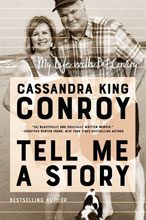 Dear reader, I wrote a version of the following piece two summers ago – not for Lowcountry Weekly, but for my blog. While it’s old to me, I think it’ll be new to you. (Nobody reads my blog.) Please note: I am NOT currently in California - that was a couple of years ago, too - but the scenario that unfolds here could have unfolded any time, anywhere, off just about any exit in the United States of America.
Dear reader, I wrote a version of the following piece two summers ago – not for Lowcountry Weekly, but for my blog. While it’s old to me, I think it’ll be new to you. (Nobody reads my blog.) Please note: I am NOT currently in California - that was a couple of years ago, too - but the scenario that unfolds here could have unfolded any time, anywhere, off just about any exit in the United States of America.
***
I’ve been traveling.
Last week, my family and I flew from South Carolina to California to visit relatives, attend a family wedding, and have ourselves some fun. For days, we knocked around fabulous San Francisco - which feels like a European city and sounds like one, too - and now we’re about an hour and 1/2 from there in Woodland, my husband’s hometown. In between destinations, we visited Muir Beach, where my daughter put her feet in the Pacific for the first time, and Muir Woods, where the giant redwoods brought me to tears.
There are so many wonderful things to say about this trip, and maybe I will later, but for now I need to get something out of my system. It’s something sad and perplexing, a puzzle I can’t stop trying to solve.
On our drive from Muir Woods to Woodland, we found ourselves stuck in a long, excruciating traffic jam. We were in the proverbial middle of nowhere - it felt like nowhere, anyway - and there was no end to the inch-worming chain of cars ahead. Nor were there any exits in sight. This being the case, my daughter had to use the bathroom. Of course.
After about 45 minutes - and an escalating stream of complaints from the backseat - the traffic finally started to ease and we came upon an unassuming exit, featuring one dingy gas station (Shell, I think?) with a Jack-in-the-Box next door. Amelia was desperate by now, so up the ramp we went. I rushed into the gas station with her, only to find that - ack! - the bathroom was out of order. “Go next door!” Jeff shouted from the car window, so into the Jack-in-the-Box we practically tumbled. The sign on the bathroom door there read, “This bathroom is for paying customers only.” It was locked.
Okay, fair enough. I went to the counter and ordered Amelia a Sprite.
“Do I need a key for the bathroom?” I asked. The young woman behind the register looked at me with dead eyes and said, “I have to buzz you in.” With a lack of enthusiasm that bordered on hostility, she pushed some button behind the counter, we heard a buzz, and Amelia was able to open the bathroom door. She reported later that the bathroom was “grimy and smelly,” but, hey, beggars can’t be choosers.
As I waited for my daughter to emerge, I noticed a sign on the wall of this gray, nondescript restaurant that read, “Thirty minute seating limit. No Loitering.” I looked around at the empty establishment – it was about 3:30 in the afternoon - on this barren piece of dirt off the interstate, and I felt an infinite sorrow wash over me. I couldn’t wait to get out of there.
Later that night, in Woodland, I told one of my dinner companions about this experience. The sign on the bathroom door . . . the rude service . . . the “No Loitering” policy . . . the overwhelming sense of unwelcome.
“Well, what did you expect?” he asked me.
I sat quietly, thinking about that question.
“I don’t know,” I said. More. I guess I expected more.
“Why?” he asked, bemused, as if I were speaking some foreign language called . . . Pollyanna.
“Well . . . why not? It’s a restaurant. I assume they want customers. Why would anybody patronize a place that makes you feel so . . . unwanted? It’s bad for business. And then there’s just plain ol’ good manners to consider. And kindness. ‘Do unto others,’ and all that . . .
“Look,” he said, “It’s a bad part of town in a bad city.” (Apparently, we’d been on the outskirts of Vallejo.) “That’s just the way things are in places like that. The way things have to be.”
Well, okay.
But what I know is this: As we drove away from the exit toward Woodland earlier that day - toward our West Coast cousins who couldn’t wait to see us, who would welcome us into their home with joy, feed us, pour us wine – I couldn’t stop thinking about the people at the Jack-in-the-Box. The girl behind the register with the dead eyes . . . the imaginary customers who entered the door of that drab building, looking for food or a bathroom or maybe just somewhere to sit and rest. I thought about how that place made me feel unwelcome. Unworthy. Under suspicion. Even a little bit guilty. (Or was it humiliated?)
What happens when you treat somebody that way, day in and day out? Is this how criminals are made? Think of that Jack-in-the-Box as a microcosm of “the system.” When “the system” assumes you have bad intentions from the get-go, do you eventually lose faith in “the system” and just learn how to work it, to game it, thus becoming what “the system” assumed you were in the first place? Is this some kind of cruel cycle - something going on in every bad part of town in every bad city – and if so, how do we break it?
The ancient Greeks prized hospitality as a virtue. So did the Jews and the early Christians. “Do not neglect to show hospitality to strangers, for thereby some have entertained angels unawares.” What would they have made of the “No Loitering” sign? The unfriendly - unhappy? – girl at the register?
Do kids who continually encounter locked bathrooms, “No Loitering” signs, and callous service grow up to be unfriendly, unhappy girls at registers . . . or worse? Which came first, the chicken or the egg?
I know I’m being dramatic, making a big something out of a small nothing. It was a fast food joint in a dicey area off an isolated exit. I understand that an establishment like that feels it must protect itself from those who would take advantage of its hospitality. And, certainly, from the “criminal element.” You can’t be too careful. And yet . . .
Is this really “the way things have to be”?
These questions haunted me as we rode in silence toward a lovely, leafy neighborhood in Woodland, where people were happily awaiting our arrival.





